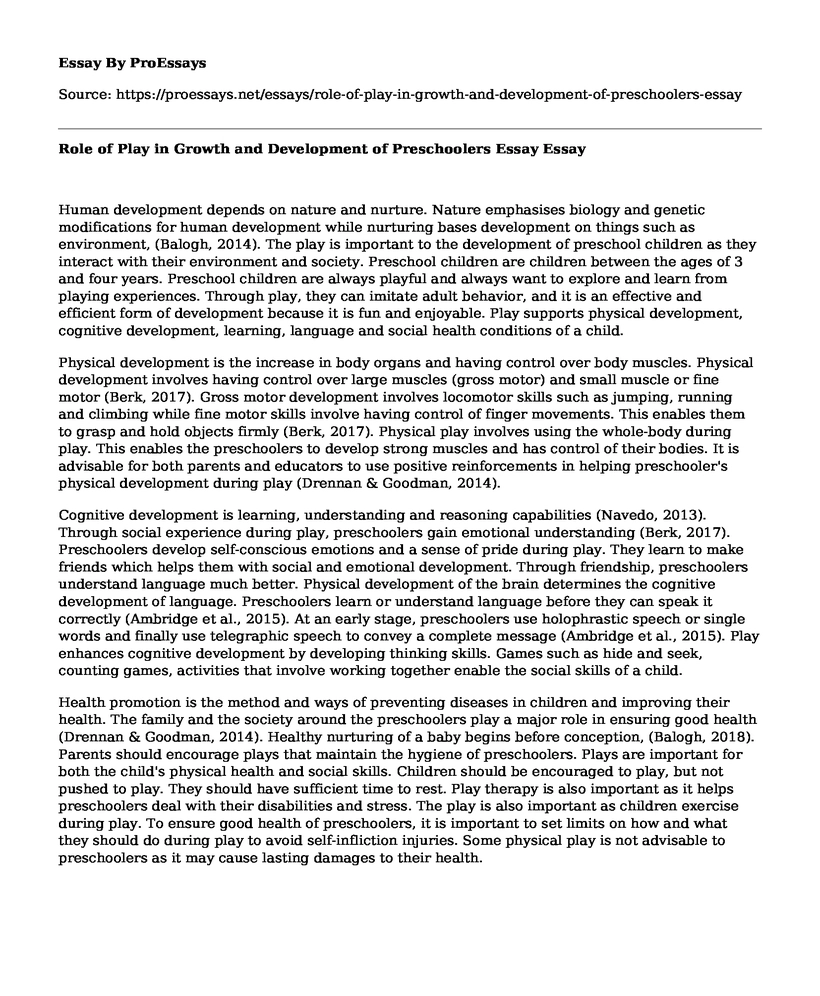Human development depends on nature and nurture. Nature emphasises biology and genetic modifications for human development while nurturing bases development on things such as environment, (Balogh, 2014). The play is important to the development of preschool children as they interact with their environment and society. Preschool children are children between the ages of 3 and four years. Preschool children are always playful and always want to explore and learn from playing experiences. Through play, they can imitate adult behavior, and it is an effective and efficient form of development because it is fun and enjoyable. Play supports physical development, cognitive development, learning, language and social health conditions of a child.
Physical development is the increase in body organs and having control over body muscles. Physical development involves having control over large muscles (gross motor) and small muscle or fine motor (Berk, 2017). Gross motor development involves locomotor skills such as jumping, running and climbing while fine motor skills involve having control of finger movements. This enables them to grasp and hold objects firmly (Berk, 2017). Physical play involves using the whole-body during play. This enables the preschoolers to develop strong muscles and has control of their bodies. It is advisable for both parents and educators to use positive reinforcements in helping preschooler's physical development during play (Drennan & Goodman, 2014).
Cognitive development is learning, understanding and reasoning capabilities (Navedo, 2013). Through social experience during play, preschoolers gain emotional understanding (Berk, 2017). Preschoolers develop self-conscious emotions and a sense of pride during play. They learn to make friends which helps them with social and emotional development. Through friendship, preschoolers understand language much better. Physical development of the brain determines the cognitive development of language. Preschoolers learn or understand language before they can speak it correctly (Ambridge et al., 2015). At an early stage, preschoolers use holophrastic speech or single words and finally use telegraphic speech to convey a complete message (Ambridge et al., 2015). Play enhances cognitive development by developing thinking skills. Games such as hide and seek, counting games, activities that involve working together enable the social skills of a child.
Health promotion is the method and ways of preventing diseases in children and improving their health. The family and the society around the preschoolers play a major role in ensuring good health (Drennan & Goodman, 2014). Healthy nurturing of a baby begins before conception, (Balogh, 2018). Parents should encourage plays that maintain the hygiene of preschoolers. Plays are important for both the child's physical health and social skills. Children should be encouraged to play, but not pushed to play. They should have sufficient time to rest. Play therapy is also important as it helps preschoolers deal with their disabilities and stress. The play is also important as children exercise during play. To ensure good health of preschoolers, it is important to set limits on how and what they should do during play to avoid self-infliction injuries. Some physical play is not advisable to preschoolers as it may cause lasting damages to their health.
Conclusion
Nursing consideration involves setting a good playground in the residential areas. It should educate on the importance of play in a child's development and encourage parents to play with their children to help them physically and socially. Use of qualified nursing for preschoolers born with conditions that need special attention (Drennan & Goodman, 2014).
References
AMBRIDGE, B., KIDD, E., ROWLAND, C. F., & THEAKSTON, A. L. (2015). The ubiquity of frequency effects in first language acquisition. Journal of Child Language, 42(2), 239-273. doi:http://dx.doi.org/10.1017/S030500091400049X
Balogh, V.,B.F.A.I.H.C.P.Y.T. (2014). From womb to world: Folic acid and iron benefits and future health implications. International Journal of Childbirth Education, 29(3), 38-41. Retrieved from https://search.proquest.com/docview/1545045469?accountid=131932
Berk, L. (2017). Development through the lifespan. Pearson Education India.
Drennan, V., & Goodman, C. (Eds.). (2014). Oxford Handbook of Primary Care and community nursing. Oxford Handbooks in Nursing.
Navedo, C. M. (2013). Benefits of baby sign on cognitive development in infants (Order No. 1539978). Available from Nursing & Allied Health Database. (1416351789). Retrieved from https://search.proquest.com/docview/1416351789?accountid=131932
Cite this page
Role of Play in Growth and Development of Preschoolers Essay. (2022, Aug 23). Retrieved from https://proessays.net/essays/role-of-play-in-growth-and-development-of-preschoolers-essay
If you are the original author of this essay and no longer wish to have it published on the ProEssays website, please click below to request its removal:
- Research Paper on Helping Young Children Learn Language and Literacy
- The Graduate Capabilities Sought by Employers Paper Example
- How to Establish Democratic Schooling in Rural Area Schools Paper Example
- High School Start Times: Helping Students Get More Sleep - Essay Sample
- Essay Example on Nursing Student Characteristics: Skills for Future Success
- Paper Sample on Excelling Academically: Achieving Success Despite Humble Beginnings
- Grandma's Delicious Recipes: My Baking Journey with My Grandmother - Paper Sample







